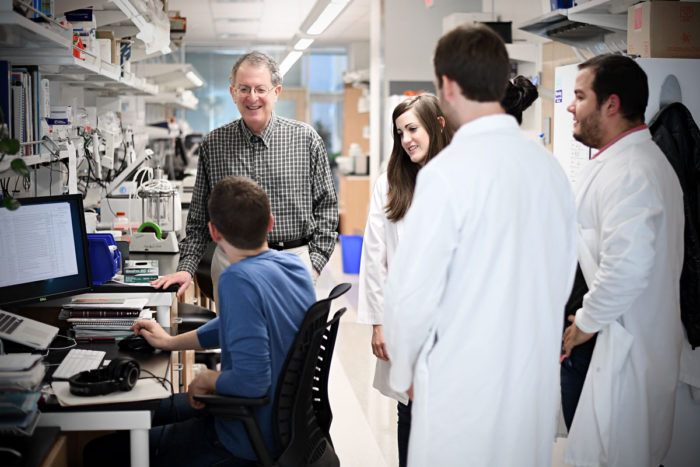Gordon receives Sanofi-Institut Pasteur Award
Scientist honored for role in founding, leading field of gut microbiome research
 James Byard
James ByardJeffrey I. Gordon, MD, (left) speaks with members of his lab in the Edison Family Center for Genome Sciences and Systems Biology. Gordon is a recipient of this year's Sanofi-Institut Pasteur Award for his body of research demonstrating the importance of the gut microbiome in human health and disease.
Jeffrey I. Gordon, MD, a world-renowned scientist at Washington University School of Medicine in St. Louis, has received the Sanofi-Institut Pasteur International Award for his role in founding and leading the field of gut microbiome research. Together with talented students and colleagues, Gordon’s work has led to a fundamental shift in the way scientists understand the relationship between microbes, human health and disease.
The award recognizes scientists who have made outstanding contributions to biomedical research in fields that profoundly affect global public health. In addition to Gordon, the 2017 award recipients are Michel C. Nussenzweig, MD, PhD, of The Rockefeller University in New York, and Antonio Lanzavecchia, MD, of the Institute for Research in Biomedicine at Università della Svizzera Italiana, Bellinzona, Switzerland.
“This award honors the dedication and extraordinary talent of the many doctoral students, postdoctoral fellows, staff and collaborators who I have had the privilege and pleasure of working with over the years,” said Gordon, the Dr. Robert J. Glaser Distinguished University Professor and director of the Edison Family Center for Genome Sciences and Systems Biology.
Gordon’s lab has pioneered ways to dissect the inner workings of the community of trillions of microorganisms that colonize the human gut after birth. The goal is to identify groups of microbes that influence specific features of human biology. By colonizing animals raised under germ-free conditions with gut microbes recovered from humans representing different ages and health states, his group has been able to tackle the formidable problem of determining how these organisms affect us. Combining these models with human studies has created a pipeline for discovering how to recognize and repair abnormalities in the gut community.
“Given the challenge we face this century in generating sufficient quantities of affordable, more nutritious foods for a rapidly growing population, a key focus of our group has been to seek to improve health status through greater understanding of how gut microbes recognize and process components of the food staples we currently consume or could consume in the future,” Gordon said.
This focus has led Gordon and his students to study how proper development of the gut community in infancy and childhood is linked to nutritional status and healthy growth.
Gordon and his colleagues have shown that gut microbial communities — the microbiota — of children living in low-income countries and suffering from malnutrition exhibit arrested development, leaving their microbiota locked in an immature state that is not repaired with currently available interventions. Their studies have identified key microbes that effect growth and are underrepresented in the immature microbiota of malnourished children. These microbes have become therapeutic targets.
Gordon’s group has gone on to develop microbiota-directed therapeutic foods designed to improve the representation and expressed beneficial functions of these targeted microbes and thus repair microbiota immaturity. He and his colleagues at the International Centre for Diarrhoeal Disease Research in Bangladesh are now conducting clinical trials to test their new therapies.
“We hope that learning how to repair an immature microbiota will inform new recommendations for feeding children as they are weaned from an exclusive milk diet,” Gordon said. “A goal is to cultivate development of a healthy gut microbiota. Providing more knowledgeable and effective stewardship of community formation should have long-lived and potentially lifelong beneficial effects.”
Gordon’s collaborator, Tahmeed Ahmed, PhD, who treats malnourished children and heads the Nutrition Program at the International Centre for Diarrhoeal Disease Research in Bangladesh, said, “Millions of children suffer from malnutrition in low- and middle-income countries and are at increased risk of death and impaired brain development. Dr. Jeffrey Gordon’s research with us on gut microbiota of Bangladeshi children has shown how the microbiota contributes to the nutritional status and health of the child.
“The cutting-edge science that he is doing with us is likely to revolutionize the way children are treated for acute malnutrition,” Ahmed said. “His passion to do research to improve the health of children living in developing countries, such as Bangladesh, is exemplary. It has indeed been a pleasure and a privilege working with Jeff over the last several years. I am delighted to know that he has been bestowed the Sanofi-Institut Pasteur award.”
Gordon considers his greatest award as having had the opportunity to serve as a mentor to more than 130 graduate students and postdoctoral fellows since his lab was established at Washington University. Many have gone on to become leaders in the field.
Gordon has received numerous honors for his seminal body of work on the gut microbiome. These honors include the Robert Koch Award, the Passano Laureate Award, the Dickinson Prize in Medicine, the King Faisal International Prize in Medicine, the Keio Medical Science Prize, the Massry Prize and the Louisa Gross Horwitz Prize. He is a member of the National Academy of Sciences, the American Academy of Arts and Sciences, the National Academy of Medicine and the American Philosophical Society. Gordon also holds honorary degrees from the University of Gothenburg and the University of Chicago.






